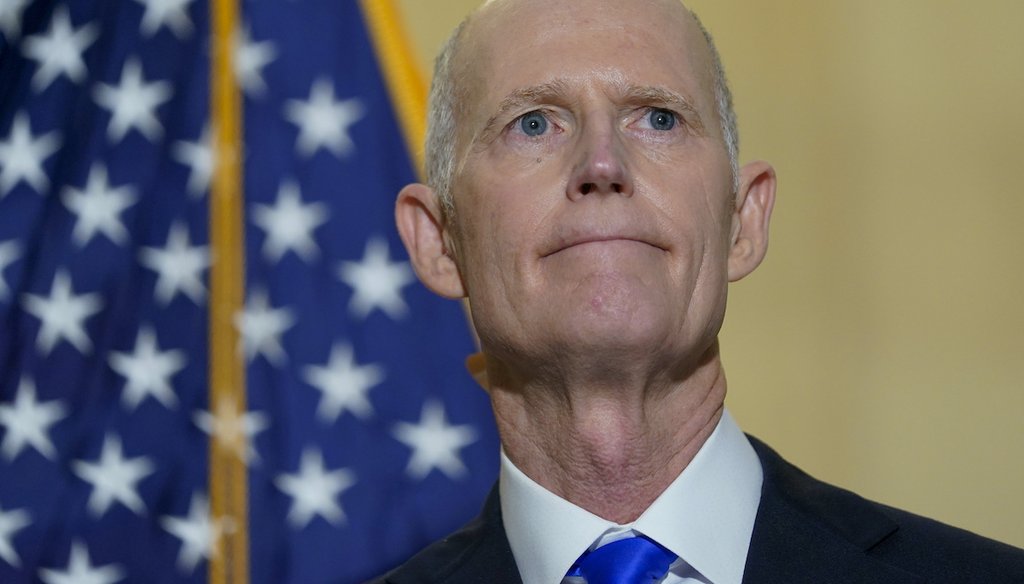Stand up for the facts!
Our only agenda is to publish the truth so you can be an informed participant in democracy.
We need your help.
I would like to contribute

Sen. Rick Scott, R-Fla., talks with reporters on Capitol Hill in Washington, on Jan. 20, 2022. (AP)
If Your Time is short
-
An 11-point Republican agenda released by Sen. Rick Scott, R-Fla., said “All Americans should pay some income tax to have skin in the game, even if a small amount. Currently over half of Americans pay no income tax.”
-
In 2020 and 2021, due to high unemployment and pandemic relief measures, about 60% of Americans owed no federal income tax, according to the Tax Policy Center. In a typical year, the percentage is closer to about 40%.
-
Scott’s spokesperson said the senator was not proposing a tax increase but did not provide specific details of what his plan entailed.
The 11-point Republican agenda that Sen. Rick Scott, R-Fla., released on Feb. 22 identified a number of priorities, including finishing the border wall, enacting a national voter ID law, and setting term limits for members of Congress.
One part of the agenda, at the bottom of page 35, touched on U.S. tax policy.
"All Americans should pay some income tax to have skin in the game, even if a small amount," said Scott’s plan. "Currently over half of Americans pay no income tax."
Many interpreted the proposal to mean that Scott intended to begin taxing those who currently do not owe any income tax, primarily the country’s lowest earners.
White House Press Secretary Jen Psaki tweeted that Scott "wants to raise taxes on half of Americans – including on seniors and working families."
In an interview with Fox News’ Sean Hannity, Scott insisted that’s not the case. He provided no explanation beyond that, and Hannity did not press for one.
So what did Scott mean?
Scott’s spokesperson said the senator was not proposing a tax increase but was mum on what he was proposing. Experts said that with the limited information provided, it wasn’t clear what else Scott could have meant.
Who isn’t paying federal income tax?
The issue at hand is not people refusing to pay the federal taxes they owe. It instead concerns people who don’t owe any federal income tax, principally because they don’t earn enough income. The size of that group has grown in the past two years, thanks to economic disruptions from the pandemic and relief policies enacted under the Trump and Biden administrations.
Experts we talked to pointed to an Urban-Brookings Tax Policy Center analysis that said that in 2020, 60.6% of all taxpayers paid no federal income tax. It estimated that the percentage for 2021 would stay high — at around 57.1%.
Based on that number, Scott was correct when he said that "currently over half of Americans pay no income tax." Chris Edwards, the director of tax policy studies at the Cato Institute, said the percentages were abnormally high because of the pandemic.
In 2022, when several temporary tax benefits expire, the percentage of Americans who will owe no income tax is expected to fall to 41.6%, according to the Tax Policy Center.
"The percentage of Americans not paying income taxes has been pretty consistently in the mid- to low 40s," said Howard Gleckman, a senior fellow at the Tax Policy Center.
Steve Wamhoff, the director of federal tax policy at the Institute on Taxation and Economic Policy, said that group includes many retirees or people with disabilities who are collecting Social Security benefits, low-income working families, and people who qualify for tax credits or make less than the standard deduction ($12,550 for single filers in 2021, and $25,100 for couples filing jointly).
These groups are still subject to other taxes, including federal payroll taxes, federal gas taxes, state and local income taxes and property taxes, Wamhoff said.
"Even if you don’t pay federal income tax, you do still have skin in the game," Gleckman said.
What does Scott say?
Scott’s spokesman Chris Hartline didn’t explain the proposal, but talked about the reasoning behind it. The senator believes there are "too many able-bodied Americans who are choosing not to work" in part because of policies enacted by Democrats that have "paid people more to not work than to work," he said.
"There are too many people who are benefiting from government services without contributing to the system," Hartline added. "That obviously would not include retirees who have paid plenty in taxes or working Americans who are paying into the system through either income tax or payroll tax."
That offers some context for Scott’s proposal, but it doesn’t square with his call for making "all Americans" pay some income tax.
Edwards from Cato said Republicans generally believe that people below a certain threshold shouldn’t pay income tax, because it doesn’t make sense to tax them and then give back various benefits.
But he said some Republicans are concerned that the refundable tax credits, such as the Earned Income Tax Credit and the Child Tax Credit, have gotten so large that they’ve begun to offset not only income tax but also payroll tax for many people.
As for Scott’s proposal, he said, "if he’s saying everyone needs to pay some income tax, then a lot of people don’t pay income tax now, so that would be a tax increase."
Other experts we talked to said that without more details, they couldn’t interpret Scott’s proposal as anything other than a call for higher taxes.
"Sen. Scott was clearly talking about the federal personal income tax, and he’s saying people who don’t pay it should pay it," Wamhoff said. "That’s a tax increase on millions of people."
Some people don’t have personal income, he said, and others might have negative income. In those situations, Wamhoff didn’t see how it would be possible for all Americans to pay income tax: "Is it no longer just a tax on income — it’s just a tax on living?"
Garrett Watson, a senior policy analyst at the Tax Foundation, a center-right think tank, said executing Scott’s proposal might involve shifting how some benefits are administered.
Watson said, for example, that moving the Child Tax Credit outside of the tax code and transforming it into a spending program that makes payments to households could increase the portion of households that owe income tax while ensuring their net benefit remains unchanged.
"It would be pretty hard to increase the portion of households paying income tax without raising their taxes, after all, but that would be netted out by the same tax benefits administered outside the tax system," Watson said.
According to Hartline, though, Scott’s concern was about the expansion of government benefits.
Gleckman said Scott’s proposal begged for more specifics.
"Show me how you’re going to take people who are currently not paying taxes and require them to pay taxes without raising their taxes," he said. "Show me the plan."
Our Sources
U.S. Sen. Rick Scott, "An 11 Point Plan to Rescue America," accessed Feb. 22, 2022
Politico, "Rick Scott pushes own GOP agenda as McConnell holds off," Feb. 22, 2022
The Washington Post, "Rick Scott thrusts the GOP back into Romney-‘47 percent’ territory," Feb. 22, 2022
Newsweek, "Rick Scott Defends Plan After His Republican Agenda Sparks Ridicule," Feb. 23, 2022
Twitter post, Feb. 22, 2022
Institute on Taxation and Economic Policy, "Senate Republicans Revive the Myth of the Takers," Feb. 22, 2022
The Washington Post, "New tax plan from leading GOP senator would require all Americans to pay federal income taxes," Feb. 23, 2022
White House Press Secretary Jen Psaki’s tweet, Feb. 22, 2022
Interview with Steve Wamhoff, the director of federal tax policy at the Institute on Taxation and Economic Policy, Feb. 23, 2022
Interview with Howard Gleckman, a senior fellow at the Urban-Brookings Tax Policy Center, Feb. 23, 2022
Interview with Chris Edwards, the director of tax policy studies at the Cato Institute, Feb. 23, 2022
Email interview with Garrett Watson, a senior policy analyst at the Tax Foundation, Feb. 23, 2022
Email exchange with Chris Hartline, a spokesperson for Sen. Rick Scott, Feb. 23, 2022
Tax Policy Center, "T21-0161 - Tax Units with Zero or Negative Income Tax, 2011-2031," Aug. 17, 2021
CNBC, "61% of Americans paid no federal income taxes in 2020, Tax Policy Center says," Aug. 18, 2021






























